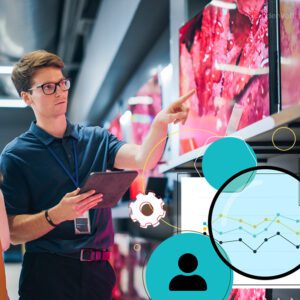The metaverse is poised to reinvent not just how shoppers interact with retailers, but even how retail operates as an industry. The technology is still in its infancy, but trailblazing brands like ASICS are gearing up to take their places on this new digital frontier that could forever change how people and businesses intertwine. The international sportswear brand discussed its plans with metaverse solution provider Boson Protocol during the 2021 Retail Innovation Conference.
“What we’re really hoping to achieve here is really our brand mission: helping people achieve a sound mind and a sound body and helping them maintain it,” said Joe Pace, Head of Business Development at ASICS during the session. “The experiences that we’re excited about providing are those that bridge the gap with the material world. For us, there’s a powerful effect that comes from moving your body. It has a powerful effect on your physical being and it has a powerful effect on your mental being, and what we’re hoping to do is leverage the metaverse to inspire those types of experiences.”
ASICS views the metaverse as a powerful potential discovery tool. Pace aims to use the channel as a format in which potential customers can discover and interact with the brand, then take that positive experience with them into the physical world. (Dive even deeper into the metaverse and its opportunities for retail at the upcoming RICE event in Chicago, May 11-12, 2022.)
“Maybe there’s a community you find that’s aligned with this brand ethos, this idea that we’re trying to inspire people to engage,” said Pace. “Maybe these are people you connect with who inspire you to move in the real world. Maybe the products you’re exploring in the metaverse are products you can use in the physical world.”
Advertisement
The Metaverse is a Seed ‘Intended to Grow and Evolve Over Time’
While the metaverse’s relationship to retail is still in the process of being defined, Pace believes three main pillars will be as “experimental, experiential and communal,” all coming together to create something that can’t be replicated in the real world.
The experimental side of the metaverse will be supported by the malleability of virtual worlds. A retailer’s home in the metaverse isn’t limited to available square footage, staff or even what’s physically possible. It can change to suit the needs of both the retailer and its customers, keeping pace with shifting trends or enabling entirely new experiences that build on the brand’s message.
“It’s highly imaginative and experimental,” said Pace. “It’s subject to change, it’s subject to evolution. You start with a hypothesis, you start with an initiation of an idea — an initiation of an experience — and what’s really nice is with it not being brick-and-mortar we can update the code and update the design. The community can update the code and update the design. It’s a seed planted that’s intended to grow and evolve over time.”
The metaverse also has the potential to expand the definition of experiential retailing. Virtual spaces enable interactivity above and beyond what’s possible in a store. Perhaps even more important, they can transcend the transactional nature that defines even the best retail experiences. Additionally, shoppers can more easily meet other like-minded customers to truly bring their virtual experience to the next level.
“It’s not an experience where you just pop in and leave, buy something or not,” said Pace. “It’s something participatory. You go in and there’s something to do, something to see, something to watch, people to speak with. It’s an experience more than just a classic transaction-only experience.”
Its potential to create a sense of community is what will tie the metaverse together, he added. Shoppers can meet fans of the same brand from across the world — an increasingly interesting prospect in a world where cross-border commerce is growing. To take advantage of these aspects of the metaverse, retailers need to design their offerings to build these communities and harness their power.
“It should feel like a warm welcome,” said Pace. “There are people [in the metaverse] who are living their own physical existences potentially somewhere else in the world, but you’re coming together around this common idea and common experience you’re interested in.”
Metaverse Commerce Could Be the Next Social Media
All that said, while selling items isn’t front and center in the metaverse, it’s still retailers’ ultimate goal. Boson Protocol aims to support the commerce element by enabling the sales of physical products as NFT vouchers. The platform enables buyers and sellers to enter transactions without the need for an intermediary, allowing for seamless commerce. While such capabilities are valuable for retail in general, they are absolutely vital for an immersion-based experience like making a purchase in the metaverse.
“We’ve been building a series of gamified experiences, or quests, so a customer can perform that quest and get access to these really special hero products,” said Justin Banon, Co-founder at Boson Protocol during the session. “The buyer will then make a payment that gets locked up in a smart contract, and they can then take an NFT voucher which then can be redeemed for the actual physical item.”
While the idea of completing “quests” to buy products may seem futuristic now, Banon believes that will change as shoppers become more comfortable with the metaverse. After all, this isn’t the first technology that took time to become commonplace in day-to-day life.
“It’s quite unusual and potentially quite uncool to not have a LinkedIn or a Twitter — this digital component,” said Banon. “We’re seeing that also with fashion. Potentially, in five years’ time, it might be unusual and potentially uncool to buy a piece of clothing that doesn’t have some sort of digital twin.”
These metaverse doppelgangers won’t just be limited to individual items. Boson Protocol has been in discussions with retailers and mall owners about launching digital versions of shopping spaces, which can blur the lines between the real world and the metaverse into what Banon calls the “omniverse.”
“These are just two aspects of reality,” said Banon. “In the same way humans have LinkedIn and WhatsApp, the physical products and locations also have a digital twin. That’s what we’re seeing in terms of omniverse commerce.”
The metaverse is still a rapidly developing medium, and as ASICS’ Pace noted, the prize for early entrants into the space will partly be “to define what the culture of what the metaverse is.” Leaders on both the retail and technology sides will be in attendance at the Retail Innovation Conference & Expo (RICE) on May 11-12, 2022 in Chicago, featuring both presentations on the subject and networking opportunities to help you prepare for this aspect of the future of retail.














